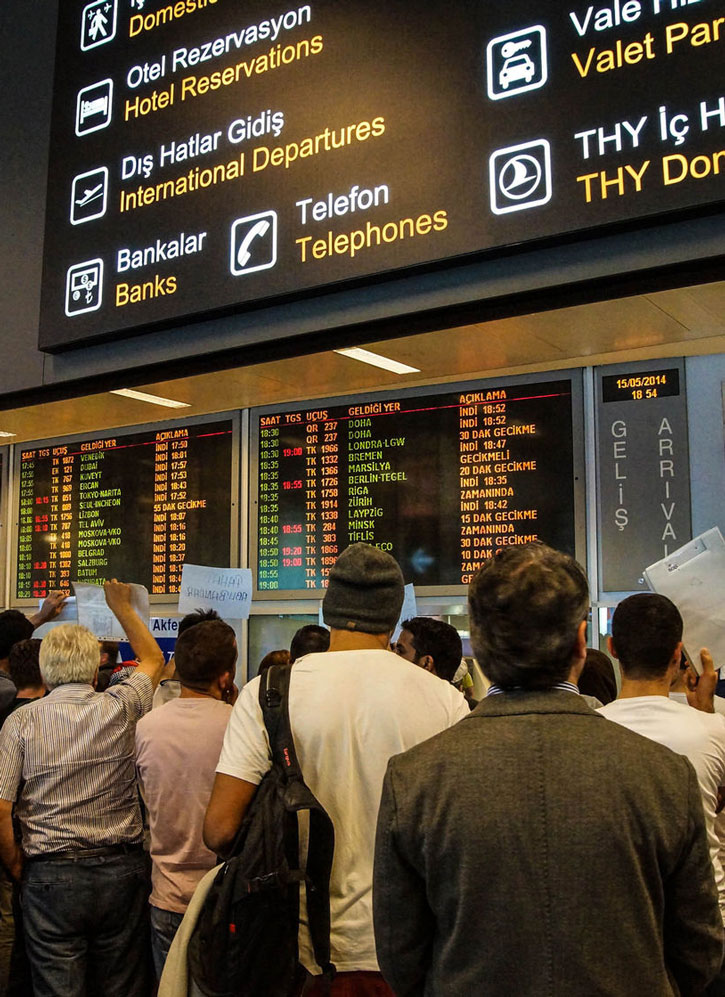Most foreign nationals need a passport that’s valid for at least six months and an e-visa to enter Turkey for tourism and trade. The official e-visa website has a list of nationalities requiring an e-visa to enter Turkey. To obtain the e-visa, complete the online form and pay a fee with a credit card or debit card prior to your arrival.
The visa is emailed to you upon payment. Print it out and carry with you on your travels, presenting it to security officials when requested.The fee for a 90-day single- or multiple-entry visa varies by country, but as a guide, in 2014 U.S. and British passport holders pay US$20, and Australians and Canadians pay US$60. The visa is emailed to you upon payment. Print it out and carry with you on your travels, presenting it to security officials when requested. The e-visa website has a comprehensive list of frequently asked questions for potential travelers. Read this information prior to applying to understand the system. Visas could once be acquired painlessly at kiosks just before passport control at Turkish airports and ports, but this system is being phased out. Overstaying your visa can result in a fine, deportation, or ban from reentering the country.
Travelers exiting customs in Istanbul’s airport are met by a throng of guides offering their services. Photo © Steve Estvanik/123rf.
Your country’s embassy or consulate in Turkey should be contacted immediately if you need emergency medical referrals, assistance with legal issues such as arrests, or passport renewal in the event of a lost document. Many nations maintain embassies in Ankara and smaller consular offices in Istanbul. You can contact embassies in the capital, Ankara: U.S. Embassy (110 Atatürk Blv., 06100 Kavaklıdere, 0312/455-5555), Australian Embassy (Uğur Mumcu Cd. 88, 7th Fl., 06700 Gaziosmanpaşa, 0312/459-9500), Embassy of the United Kingdom (Şehit Ersan Cd. 46/A, 06690 Çankaya, 0312/455-3344), and Canadian Embassy (Cinnah Cd. 58, 06690 Çankaya, 0312/409-2700). A database with contact details for all embassies and consulates worldwide can be found at http://embassy.goabroad.com.
While luggage is rarely checked on entry, be aware that the Turkish government maintains a list of items that may be brought into the country duty-free. This includes gifts to the value of €300 for travelers over age 15, €145 for those aged under 15; tobacco products limited to 200 cigarettes, 50 cigars, and 200 grams of tobacco; one 1-liter bottle or two 700-750-milliliter bottles of wine or spirits, for travelers age 18 and over; five bottles of perfume up to 120 milliliters each; medications for personal use; and food products like chocolate (up to 1 kilogram), coffee (1.5 kilograms), or tea (500 grams). Unlimited amounts of foreign currency can be brought in. Carrying, using, or importing drugs considered illegal elsewhere is forbidden and strictly punishable by law. Certain weapons and associated military equipment, such as night-vision binoculars, aren’t allowed into the country without an import license. Permission must also be obtained for filming professionally in Turkey.
Receipts for any valuable items acquired during your stay may be requested at your departure.In terms of exporting, to avoid complications on leaving the country, register valuables with no commercial purpose, such as jewelry, over the value of US$15,000 to customs on arrival so you can take them with you when you leave. If you purchased goods over this value in Turkey, keep the receipt to prove you made the purchase through legally exchanged currency. Receipts for any valuable items acquired during your stay may be requested at your departure. Large items such as expensive carpets require a valid official Certificate of Origin. This is not only necessary to export the item from Turkey but also to import it into other countries. Furthermore, Turkish law states that anything older than 100 years or dating from the late 19th century needs to be authenticated by a government or museum officials before receiving its travel papers. Dealers should provide the certificate or directions for receiving permission for export upon purchase. Don’t try to export them without permission as customs officials worldwide are well versed in Turkish antiquities and valuables thanks to an international database. Minerals are exportable, but only with a special permit granted by the General Directorate of Mineral Research and Exploration.Global Refund, the world’s leading tax-refund company, offers tax refunds for nonresidents on purchased goods over 100TL from registered sellers. Refunds can be obtained in the departure hall of Turkish airports.
Excerpted from the Second Edition of Moon Istanbul & the Turkish Coast.